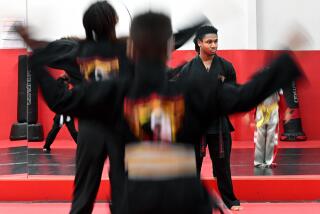‘90s FAMILY : The Price of Popularity : They’re the kids everyone wants to befriend. The football players. The cheerleaders. The <i> In Crowd</i> . Their lives seem so perfect . . . but the cost can be high.
- Share via
It’s a sunny day in the Palms district of Los Angeles and most of the students at Alexander Hamilton High School are spending their lunch break outside in the courtyard. To the right is the Brainy Clique, to their left is the Heavy Metal Clique and straight ahead is The Clique.
There they are: the In Crowd, the future Prom Court, the students who take up most of the space in the yearbook. Usually bright, good-looking and athletic, they’re at the peak of the social pecking order. The envy of their peers, the pride and joy of their families; they seem to own the world.
But along with the glory of being one of the elite, comes the stress of scrutiny and gossip, of not knowing whom to trust, and the gnawing fear of falling from the pinnacle. According to psychologists and the popular kids themselves, there is a high price to pay for popularity.
“In general, I like knowing a lot of people and having friends,” said Caryn Ward, a senior at Hamilton High who said she doesn’t consider herself to be part of the In Crowd even though her classmates pointed her out as one of the popular girls.
“But sometimes it is a little strange. Like a lot of people think I’m mean and conceited before they even get to know me and give me a chance,” she said.
“The other annoying thing is sometimes I hear these really outlandish rumors about myself. It’s like if you’re recognized, then people you don’t know think they actually know who you are and what you do and what you think. But they don’t.”
Diego Ferreira, another member of the In Crowd at Hamilton, agreed that the ever-present scrutiny of classmates can be tiring.
“I go through these periods when I feel like someone is always watching me. It’s like the littlest things I do are seen and talked about. Someone I hardly know will say something like, ‘Hey Diego, I saw you crossing the street this morning.’ But other than little things, I like it. I mean, who doesn’t want to feel liked and to feel they fit in?”
Seeking admiration and acceptance within one’s peer group is a major task of adolescence, said Jay E. Fisher, a clinical psychologist in Westwood.
“Social needs are basic psychological needs,” Fisher said, “and seeking popularity is one way a teen-ager can meet their needs for belonging or fitting in, as peers become a more important social group than the family.”
According to experts, young children rely on family members for support, validation and intimacy, and feelings of self-esteem stem primarily from the parents’ perception of them. But upon entering adolescence, young people start establishing an identity separate from their parents. So, being accepted and liked by one’s peers is often equated with being a good and worthwhile person.
With feelings of self-worth riding on popularity, the subject is a hotbed of emotions for many teen-agers. In fact, it is such a sensitive topic that most teens interviewed for this story spoke freely only after anonymity was granted.
The girls were especially wary of speaking out, saying that acknowledging their high social status would make them seem conceited. And when asked to explain their popularity, all of the girls said they could not. Boys, on the other hand, tended to view their popularity as something they earned, either through actively honing social skills or as a byproduct of other accomplishments.
The difference in the way boys and girls perceive their popularity is an extension of how others see them, experts say. Whereas boys tend to be admired for skills and attributes such as leadership, wit or athletic prowess, the popularity of girls is often associated with superficial qualities, said Joan Shapiro, a clinical psychologist practicing in Encino.
“The beautiful girls often become known on the basis of how they look and who they’re dating--like a trophy wife. They wonder ‘Who am I? Am I only valued for how I look? Does anyone like me for me?’ ” These insecurities, said Shapiro, can really wear down girls’ self-esteem.
“Actually, sometimes [being popular] can be a pain,” said Cindy, a senior at a San Fernando Valley high school. “Like last year, I gained a few pounds. It wasn’t that much, but you would have thought I killed someone or something. People were gossiping about it. Being popular isn’t about being liked and having friends. It’s about being known.”
Cindy said that she would like not to worry about how she looks every school day.
“It would be great to be able to kick it and relax like the other kids do. But I feel like I’m always being judged and I can’t relax,” she said. “Sometimes I get so stressed out getting ready in the morning that I don’t even want to go to school.”
One problem popular boys and girls share is a sense that the spotlight is very difficult to turn off in order to have some private time.
“Everyone is trying to make small talk with you and there’s always someone who wants to walk you to class. Sometimes I just want to be left alone,” said Tina, a senior at a West L.A. high school. “But you can’t complain about it or everyone will think you’re stuck-up.”
It is common for lesser-known peers to associate with popular students in order to boost their own social standing. “And then, popular kids don’t know who to trust,” said Dr. Martin V. Cohen, a Los Angeles therapist in private practice who worked as a psychologist at Granada Hills High School.
“It’s so early in life to have to be mistrusting and to be second-guessing people’s intentions of wanting to be with you. If I were to say what’s healthier--to be popular or to be average in popularity yet have good self-esteem based on internal value--I’d say being popular is not as healthy.”
After high school, most popular young people have learned skills that serve them well in life: They can get along with and influence others. But some experience depression following graduation.
“They go from being a big fish in a small pond, and then on to college and the real world, which is a much bigger pool,” Shapiro said. “And some have a hard time adjusting.”
Dean Hovey, a graduate of the South Pasadena High School class of ‘85, didn’t even have to wait for graduation to feel the sting of falling from the crest. Hovey was captain of the football team, a star athlete and the center of attention. But in the beginning of his senior year, he was seriously injured during football practice and was unable to continue playing. Not only did he lose his athletic scholarship, he also lost his social standing, identity and direction.
“My high school years were pretty bizarre,” said Hovey. “In the beginning, it was one extreme. It was the red-carpet treatment all the way. I was pretty shy so sometimes it was embarrassing. But I liked it. I guess being popular is everybody’s goal in life at that age.
“But after the injury, it was a shock to realize that things are different in reality than what I thought. Things can be so plastic. I thought people respected who I was, but it turns out many respected what I was. And if I wasn’t a star athlete anymore, then what was I?” Hovey didn’t even attend his senior prom.
In time, he landed back on his feet, and now at 27, makes a good living in the entertainment industry. He remembers his years as a popular student with affection.
But when asked if he would want any future children of his own to be popular, Hovey said: “No. I’d rather that they have their heads on straight and not have to worry about glitches in their social circles. I think it’s more important that they keep their grades in order. That way they’ll be better prepared for life.”
More to Read
Sign up for Essential California
The most important California stories and recommendations in your inbox every morning.
You may occasionally receive promotional content from the Los Angeles Times.













